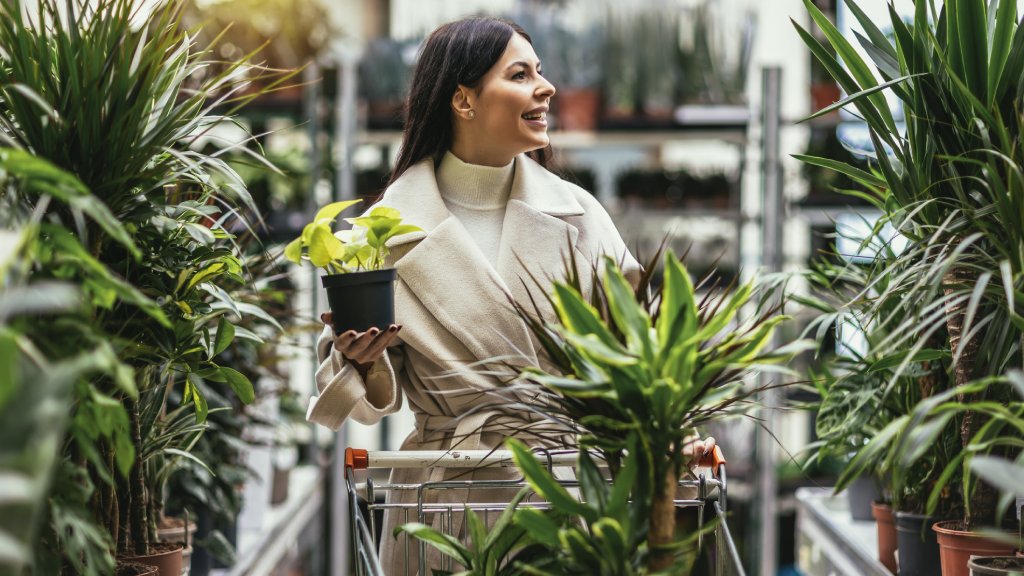
If you’re a fellow phytophile (plant lover), you understand the joy of buying plants. For years I went to the nursery to purchase my plants but, likely due to technology and possibly COVID lockdowns, I now look and sometimes buy plants online.
How to buy plants is a personal choice; some folks are diehard nursery buyers, and others are big box stores or online purchasers. If you’re wondering how to buy plants online or how to buy indoor plants, keep reading. We’ve got all the information you need to know to make an informed plant purchase.
Best Places to Buy Plants
Where is the best place to buy plants? It depends on your location, budget and internet savvy.
Big box stores and larger supermarket chains often have sales during the growing season. Warehouse clubs sporadically stock plants like bare root fruit trees or seasonal color like chrysanthemums and even big bags of summer bulbs, but these often aren’t available to those without a membership.
The farmer’s market often has vendors that sell plants and your local social media site such as Nextdoor will also often have a neighbor selling veggie or house plant starts; divided irises or even seeds, for example. You can also connect with others via the internet to purchase plants for sale.
How to Buy Plants
Plants can be purchased either in person at a nursery, home and garden center, supermarket, farmer’s market, and many other venues. Online purchases are a little trickier since you don’t get to see the plant before it arrives at your door. In either case, some sellers are more reputable than others and it pays to do some research before handing over that credit card.
Tips for Buying Plants in Person
Before you buy pretty much anything from a person, it’s a good idea to do some research. What are you looking for? If it's a business, is it accredited or rated somehow? Is there another way to vet the person such as through a social media opinion site? These sites can be valuable since they may offer different perspectives on a sale.
Sign up for the Gardening Know How newsletter today and receive a free copy of our e-book "How to Grow Delicious Tomatoes".
If you are buying plants in person at a retail site you get the benefit of eyeing the merchandise yourself. You can see if the plant looks healthy. You can also choose, often from dozens of similar plants, which one looks the best to you.
As to what you’re looking for? Check for signs of disease or pests. Look for mottled, chlorotic, holey, or scarce foliage. If you can view the roots, they should be firm and white, but if they’re spilling out of the bottom or top of the plant, it may be rootbound.
Annuals, perennials and veggies shouldn’t be limp or wilted but rather staunchly upright. Keep an eye open for any broken branches or damage to trunks or stems of trees and shrubs.
Overall, the plant should have shiny, healthy-looking foliage and be lacking damage to the roots, stems, trunk and leaves. Select flowering plants with new buds rather than those that are in full bloom or with spent blossoms.
Tips for Buying Plants Online
Because you can’t physically view the plant, purchasing online is a bit dicier than buying in person. That means you need to be able to trust the online seller. It also doesn’t hurt if they have a clear return policy.
Some online sellers offer rare specimens, giving them a niche in the market. Others entice buyers with free shipping or bulk discounts. Some sites specialize in bulbs or succulents or house plants, while still others sell trees and shrubs. So what should you be aware of before purchasing online?
First, check into the plant you're hungering for. Look up its cold and heat tolerance, sun exposure and invasiveness. If you want a container-grown plant, is this the best selection? Is it messy? What companion plants will go well with the plant? How tall and wide will it get at maturity?
If all signs point to a purchase, it's time to evaluate the site you wish to purchase from. Check into their return policy or warranty, how they package their plants, shipping costs, and price points in comparison to other sites. What size pot will the plant be coming in? Is there a way to reach them in case of a problem or for further information?
A note on shipping: Shipping costs are likely to be passed onto the consumer but, most of the big shipping companies charge according to dimensional weight. This means that they have a standard minimum weight based on the dimensions of the box sent. What this means to you is that as long as you stay below their calculated dimensional weight, you can fill the box with as much or as little for the same cost… provided you don’t go over the dimensional weight.
So you might as well tuck in another little 4-inch miscanthus, right?

Amy Grant has been gardening for 30 years and writing for 15. A professional chef and caterer, Amy's area of expertise is culinary gardening.
